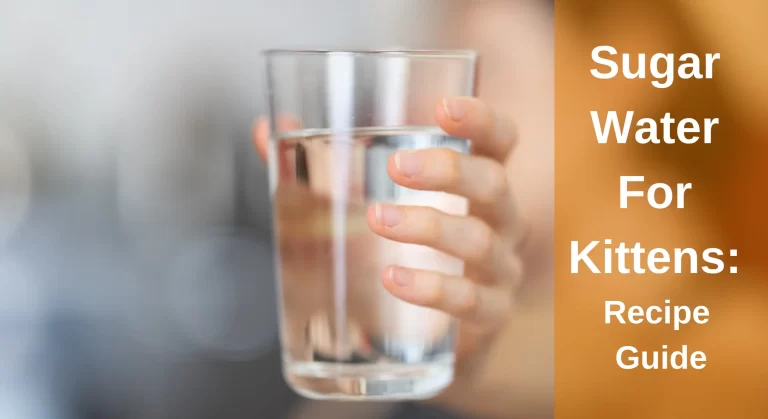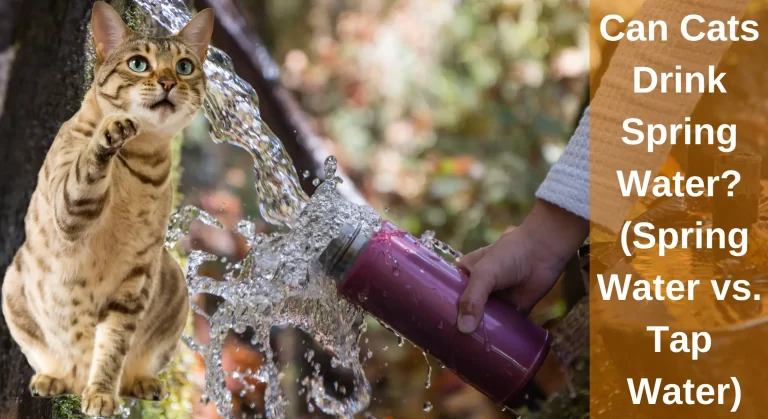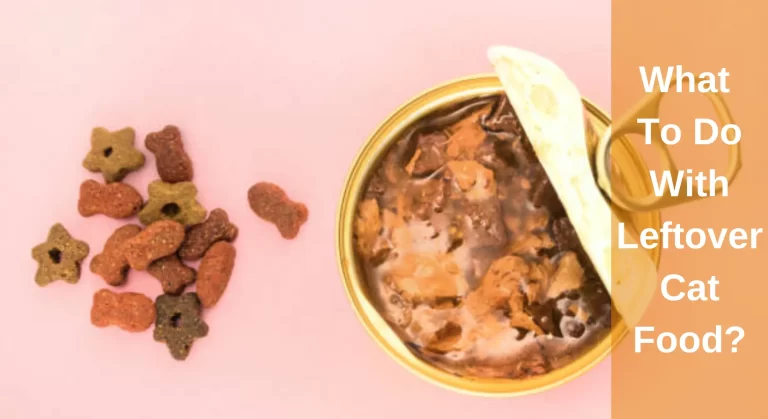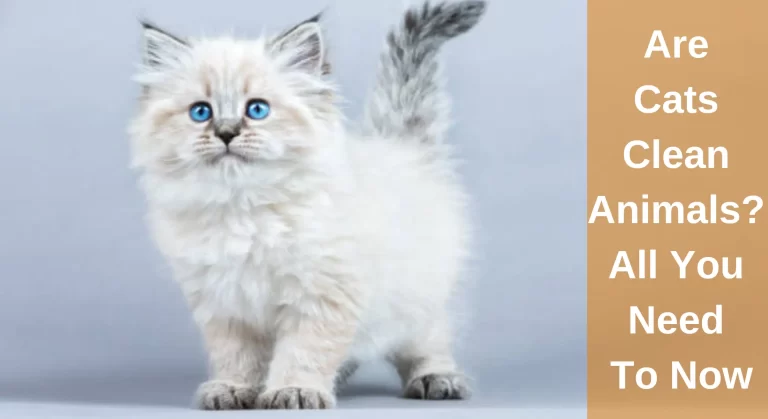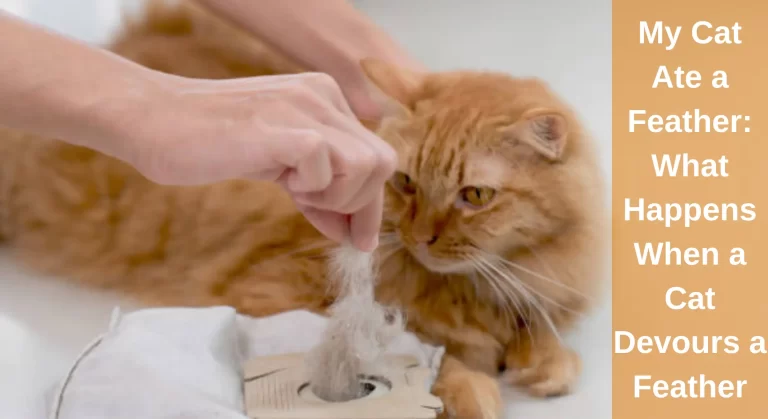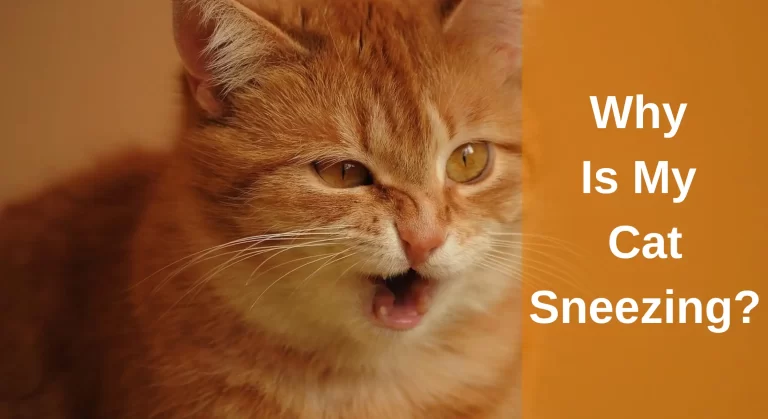My Cat Ate Plastic Wrapper: What Should I Do [Answered]
Cats are incredibly curious animals, especially when they are young. Sadly, they can occasionally get into problems because of their curiosity! Especially when playing, toddlers may unintentionally chew and ingest anything they shouldn’t, which also contains plastic. But why do felines eat plastic and what will happen if they do so?
Cats like plastic due to its crinkling sound, the aroma of food it formerly includes, and the smooth texture of it feels appealing to its paws. But, unfortunately, Plastic can cause potential suffocation and strangling risks. Consuming plastic can lead to gastrointestinal blockages in addition to smaller issues like diarrhea and vomiting.
Whatever kind of plastic is consumed by your cat, he may experience severe health issues. Want to assist your furry friend but are unsure how? Relax! This article will the risks of swallowing plastic, the signs of cats eating plastic, and how to overcome the danger in more detail. Continue reading to help your felines from fighting this serious problem.
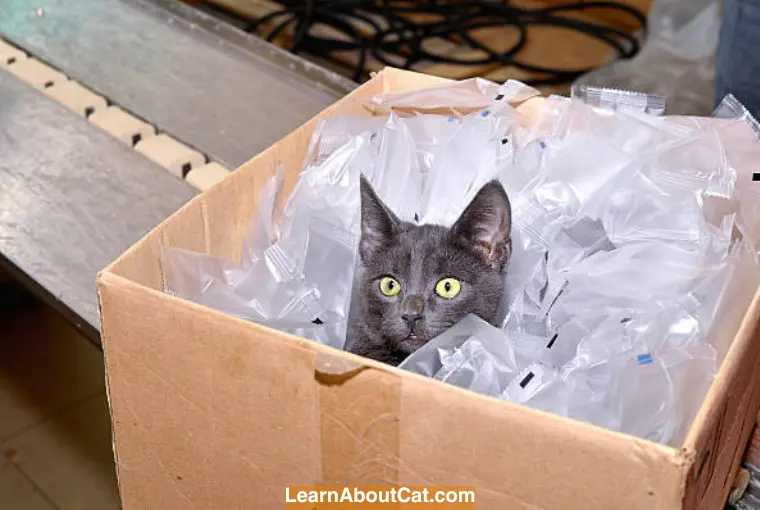
Can Cats Digest Plastic Wrap? Is it OK for Cats to Eat Plastic Wrap?
No, it’s not good for felines to eat plastic wrap as they can’t digest it and it can stuck in their gut causing obstruction and preventing food and fluids from flowing through the intestinal wall or stomach.
Plastic is not a natural or digestible material for cats. The digestive system of cats is not equipped to break down and process plastic materials. When ingested, plastic can cause blockages in the digestive system, leading to various health issues such as choking hazards, intestinal blockage, and potential toxicity.
Moreover, chewed plastic particles could be problematic, especially if they are hard and spiky. Rough fragments could get stuck in the gastrointestinal tract or stomach and cause irritation or a potentially hazardous rupture or tear.
Also Read: My Cat Ate a Feather: What Happens When a Cat Devours a Feather
What Happens if a Cat Eats Plastic Wrap? The Dangers of Cats Ingesting Plastic
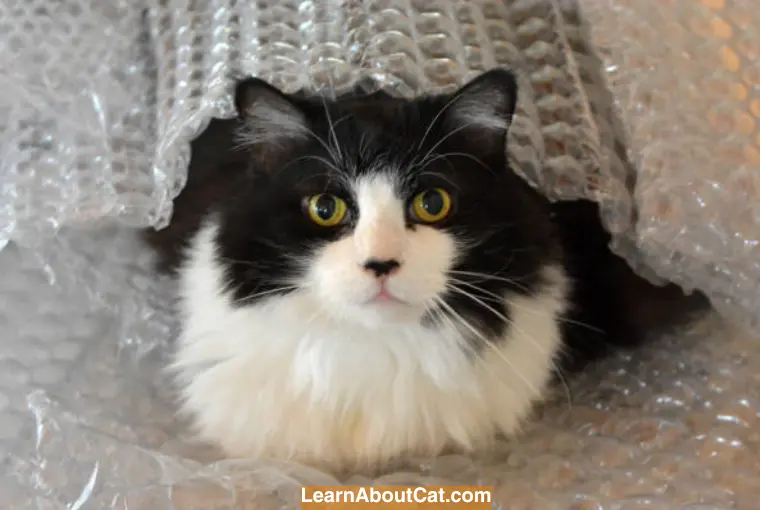
Choking Hazard
Plastic wrappers, such as those found on food packages or household items, can easily tear into small pieces. If a cat chews on a plastic wrapper and swallows a fragment, it can become a choking hazard. The small size and irregular shape of the plastic can obstruct their airway, causing them to choke or struggle to breathe. This is an emergency situation that requires immediate attention.
Intestinal Blockage
Another risk associated with cats eating plastic wrappers is the potential for intestinal blockage. When a cat ingests a larger piece of plastic, it may pass through the esophagus without causing immediate harm. However, as it travels through the digestive system, it can get stuck in the stomach or intestines. This blockage can lead to severe pain, vomiting, dehydration, and even life-threatening complications requiring surgery.
Toxicity
Certain types of plastic wrappers can also be toxic to cats. Some plastics contain chemicals, such as phthalates or BPA, which are harmful when ingested. If your cat consumes a plastic wrapper made from toxic materials, it can result in gastrointestinal distress, organ damage, or even poisoning. It’s crucial to be aware of the types of plastics your cat may encounter and take appropriate precautions.
Check Out: My Cat Ate a Dryer Sheet: What to Do Now
How Do I Know if My Cat Ate Plastic Wrap: Signs That Your Cat Has Eaten Wrappers
The first signs might not show up right away, and they might take a few hours to manifest. Your cat’s mouth or lips could get cut by plastic fragments. Suffocating is yet another potential danger.
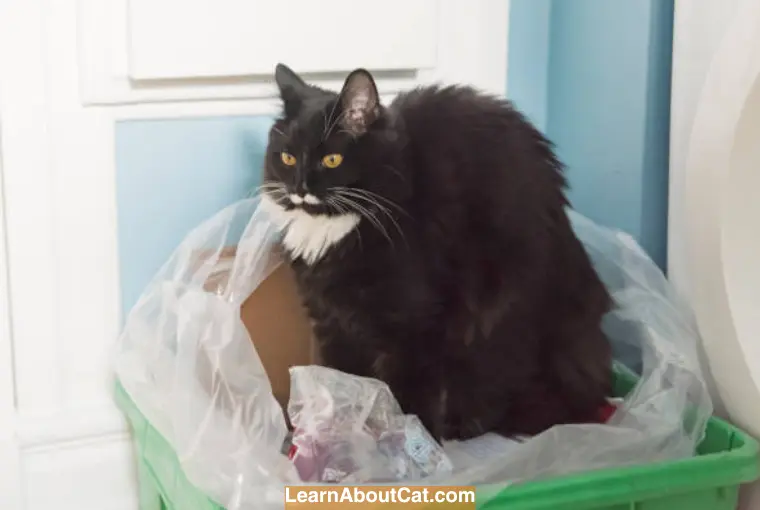
- Vomiting frequently and repeatedly, especially if plastic fragments are present.
- An alteration to their stools (dysentery, blood, or constipation)
- Decreased appetite
- Lethargy
- Abdominal pain or discomfort, often exhibited by hunching over
- Difficulty breathing or rapid breathing
However, if a perforation in the intestines develops, your feline may also suffer from these signs as well as a peritonitis condition brought on by leaky gut secretions, which can also make your feline faint or develop a fever.
If a blockage isn’t addressed right away, it can be quite harmful to your feline as it may cut off blood circulation to its digestive system.
Also, Check Out: My Cat Ate Rubber Band? What Should I Do
What Do I Do if My Cat Eats a Plastic Wrapper? Immediate Steps to Take if Your Cat Eats a Plastic Wrapper
Don’t freak out. Plastic is not a healthier choice for cats, yet there are certain measures you may do to support your cat. Discover the right behavior to uphold by reading the information below.
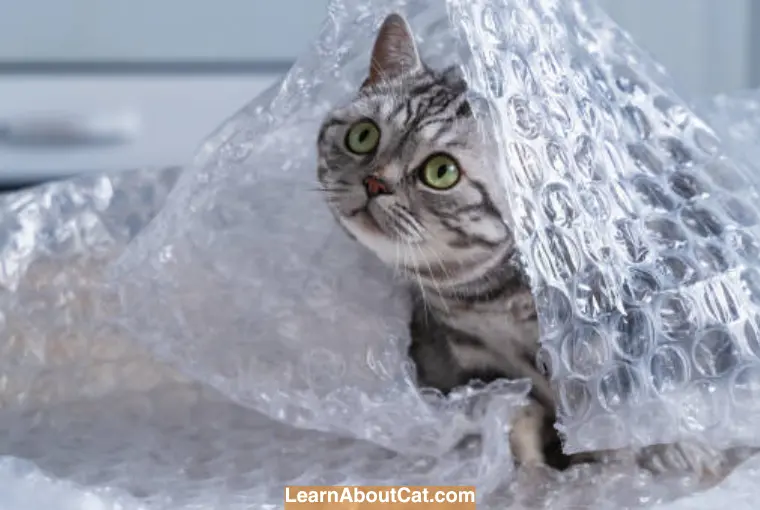
Prevent Further Consumption
Safely relocate your cat from the area to facilitate the thorough removal of any remaining plastic. In cases where your cat has ingested a plastic wrapper or a plastic bag, it is crucial to ascertain the contents within. These contents may pose a significant threat to your cat’s well-being, including cleaning agents, chocolate, sugar-free gum, and medication.
Observe and Monitor and Check at the Vomit
Keep an eye on your cat’s behavior. Instead of trying to stop your cat from throwing up after eating plastic, try to assist it. The puking is a positive indication as it shows that your feline is trying to react. However, keep in mind that cats frequently vomit due to their sensitive stomachs, so you should check the appearance of the vomit and whether or not any bits of plastic are present.
For instance, cats may puke if they have Hurballs in their stomachs, which interfere with their ability to properly digest food, or if they ended up eating quickly.
If your feline can vomit the plastics by itself, keep track of how often it did and the time between each vomiting. If the cat throws up multiple times, stops within a day, and then demands food, it might not be in any danger.
Keep an eye out for any changes in their eating habits, litter box usage, or overall demeanor. Document any abnormal symptoms or patterns, as this information will be valuable when consulting with a veterinarian.
You Might Like to Read: My Cat Ate a Whole Bag of Treats: What Should I Do? [Answered]
Keep an Eye on the Situation – Contact a Veterinarian
Regrettably, things can turn out differently. Get your cat to the doctor right away if you observe it gags yet doesn’t vomit, might seem more active than normal, rejects food, or has any of these symptoms.
Plastic is an occluded substance that builds up in the tiniest areas of the gastrointestinal tract and can be fatal to your cat. Being the smallest portion of the digestive tract, plastic is typically seen where the intestinal wall merges or in the lower portion of the stomach.
The veterinarian will determine whether the cat requires medical attention after examining the condition or whether it would be preferable to give some time for the plastic bits to come out.
Although this type of surgery is extensive, the cat may return home a short while later. Arrange your house to keep the cat comfy since the cat will likely need to relax for a while.
Allow Your Vet to Examine the Organs in Your Cat
No matter what’s the size of the plastic wrap that your feline consumed or what procedure was required to get it out of its body, it is advised that you speak with your veterinarian about a potential examination of your feline’s organs; especially the liver and kidneys.
This is due to the possibility that plastics give off chemicals that may harm those organs when it’s mixed with a cat’s digestive fluids. Your felines’ blood will be drawn by your veterinarian, who will then perform a few tests.
Find Out: My Cat Ate A Chocolate Chip: Will 1 Chocolate Chip Hurt a Cat
Will My Cat Be Okay if They Eat Plastic?
If your cat has eaten plastic, it is important to take the situation seriously. The outcome depends on various factors such as the size of the plastic piece ingested and the specific health condition of your cat.
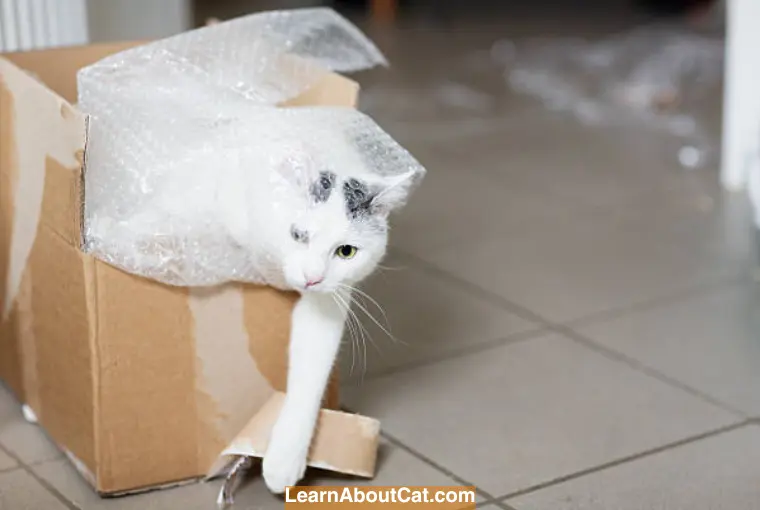
What If the Plastic Wrapper Happen to Be Small and Soft
You do have a choice of waiting and watching your feline if the plastic your feline ate was a tiny plastic item. A bit of plastic may require your cat about 10-24 hours to eliminate. If the issue is more severe than you believe at first, it is still recommended that you bring your feline to the vet for consultation. To assist the plastic and foodstuff travel through the digestive tract more quickly, the veterinarian may advise giving the feline laxatives or fiber stimulants.
Every few hours, look for indications of the plastic wrap in your feline’s litter tray. Little foreign objects are typically easily ejected by cats.
What If the Plastic Wrapper Happen to Be Big and Stiff
If your feline consumes a large chunk of plastic wrapping, there’s a chance that the plastic was wrapped into a variety of food products that could get stuck in the gastrointestinal tract and stomach. This may unintentionally shut off the blood to some intestinal sections, potentially killing them.
Particularly if your feline is exhibiting blockage symptoms like nausea, drowsiness, flinching, diarrhea, or constipation, you must take your feline friend to the doctor right away.
Trying to pull on a plastic fragment that is protruding from the feline’s mouth or sphincter could inflict more damage than benefit since the other side might remain lodged farther into the gastrointestinal tract. To find the plastic, the doctor may require many X-rays. Endoscopy can be used to extract plastic that remains within the stomach, however, if it’s gone farther downwards, an operation may be necessary.
Why Does My Cat Ate Plastic Wrappers?
Before discussing the ways to stop felines from eating plastic or what to do in this situation, let’s first talk about why they like to eat it:
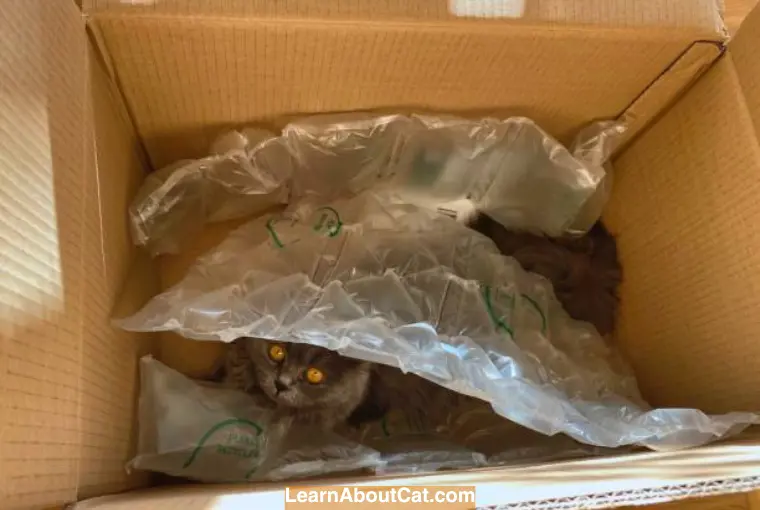
Leftover Food Odors
Cats are recognized for having keener noses that enable them to detect odors at great distances. Your cat may nibble or ingest plastic to taste the food residuals such as the smell of meal leftovers in plastic bags. It’s crucial to properly dispose of plastics that contain food and to ensure that cats can’t access these materials while they’re sitting on a table.
Distress and Tension
Cats have behaviors they engage in when they’re stressed or anxious, just like certain humans do, such as biting their nails. Cats may feel relaxed by nibbling on plastic wrappers. You can see your cat attacking objects in your house when it’s experiencing anxiety. This typically happens after your feline has suffered a significant shift in its daily life, such as leaving its current home, getting a new animal, or its guardians welcoming a newborn home.
Nutrient Deficiency in Cats’ Food
The cat will likely nibble on plastic wrappers if its body signals that it isn’t getting sufficient nutrition from the meal you’re feeding it. Since their bodies genuinely need and require that deficient nutrients, that’s why felines chew plastic wrappers as an instant response. So, take care while choosing the meal you give your cat.
Some cats have a condition called pica, which is characterized by the urge to eat non-food items. This can include plastic, fabric, or other inappropriate objects. Pica can be caused by various factors, including nutritional deficiencies, anxiety, or underlying medical conditions.
Health Problems
Many medical issues have been linked to the behavior of chewing plastic. The most prevalent ones include dental problems, anemia, diabetes mellitus, and hyperthyroidism. Brain tumors in certain cats can alter their behavior to the point that they start chewing plastic.
Interesting Reading: My Cat Ate My Garlic Bread: What Should I Do [Answered]?
Why the Wrapper Attracts Cats?
Cats are famous for being lively and inquisitive, and they are frequently drawn to objects with which they can play or explore. Cats may find the scratchy feel and noise of plastic wrap especially alluring since it can arouse their curiosity and excite their instincts.
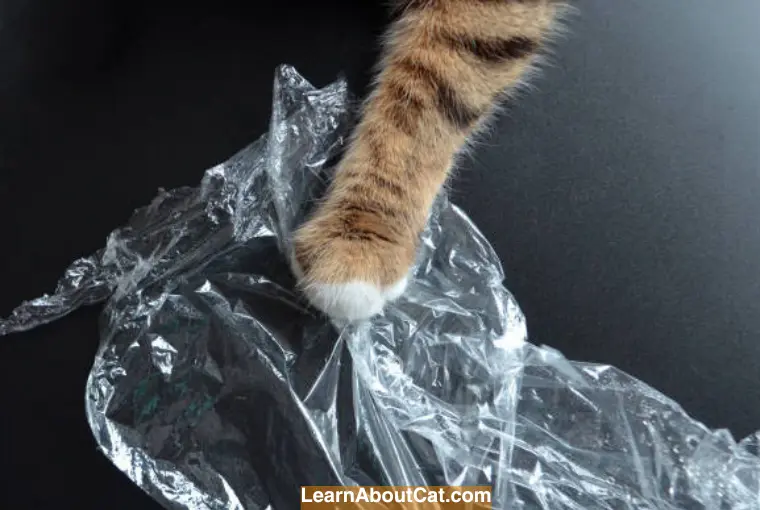
Also, some felines might connect the noise of a scratching wrap with the noise of a surprise or foodstuff being unwrapped. Cats may develop a Pavlovian reaction as a result of this, learning to correlate the noise of a wrapper with the potential for a treat, which makes them extra intrigued by the wrapper in concern.
Although some cats might like to play or explore wrappers, it’s crucial to put them away from every danger, such as ingestible plastic wrappers or suffocating threats from plastic packaging. Always keep an eye on your cat when they’re playing, and make sure that every object they engage with is secure enough for them to use.
Preventing Incidents in The Future (Eating Plastic Wrappers)
The simple fix is to keep your feline from seeing any plastic products. In addition, there are several other measures that you may try to stop your cat from consuming plastic in the future. The most useful ones should be mentioned first.
- Secure Trash Bins: Ensure that your trash bins have lids or are placed in areas that are inaccessible to your cat. This will minimize their access to plastic wrappers and other potentially harmful items.
- Store Plastic Wrappers Properly: Store plastic wrappers in closed drawers, cabinets, or containers that are out of your cat’s reach. By doing so, you reduce the chances of accidental ingestion.
- Use Alternative Packaging Materials: Consider using alternative packaging materials, such as paper or cloth bags, to store items that are typically wrapped in plastic. These materials are less enticing for cats and pose fewer risks if ingested.
Alternative Options for Cats Who Enjoy Chewing on Plastic
Some cats develop a fascination with chewing on plastic, even if they haven’t ingested it. If your cat falls into this category, there are alternative options you can explore to redirect their chewing behavior:
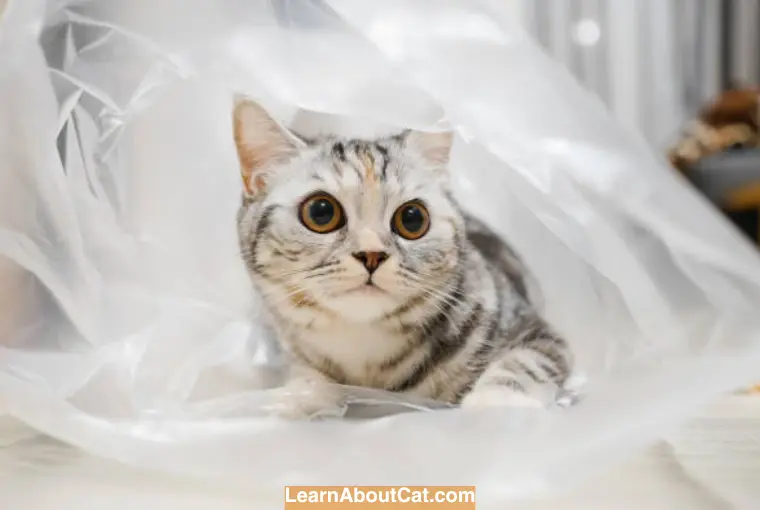
Schedule Some Playtime With Your Kitty
Your cat may experience the urge to chew foreign objects, including plastic, out of boredom. This may be your cat’s attempt to get your focus. You must schedule a room each day to engage with it because of this.
Utilize Cat Toys
Offer appropriate chew toys designed specifically for cats. These toys can help satisfy their chewing instinct and keep them engaged.
Some cats find catnip toys irresistible. By providing these toys, you can redirect their attention and provide a safe alternative for chewing.
Also, look for toys that resemble prey to help your feline to fulfill its predatory urge. They’ll be entertained by this and be distracted from plastic. Your feline will feel content and at ease thereafter as well.
Relevant Reading: Best Cat Toys for Indoor Cats Who Don’t Like Catnip
Keep Your Cat Busy While You’re Gone
Are you concerned that your cat might consume plastic when you aren’t present at home? If you want to engage your cat and protect him from strange objects, you must offer some form of amusement. You may stow away little food servings all about your house. Your cat will attempt to “search” for the foodstuff in this manner. It is a great approach to make sure they aren’t looking for plastic. Giving your cat a puzzle game is another method to keep them busy. Naturally, food is going to be the prize for cracking the riddles.
Grab a few Cat-Friendly Plants
Cats love plants, so it’s a good idea to get a few things for your feline friend’s well-being. They utilize it for a variety of activities, including chewing, digesting, and even sharpening their claws. The optimum option is to get multiple catnip plants for their tooth enamel and digestive system as well as additional harmless plants for fun and claw sharpening.
Schedule some Playtime with your Kitty
Your cat may experience the urge to chew foreign objects, including plastic, out of boredom. This may be your cat’s attempt to get your focus. You must schedule a room each day to engage with it because of this.
Hire a Trainer
If none of the aforementioned methods work, try contacting an expert cat trainer. He or she is going to ensure that your cat learns which objects are inappropriate for it to bite and ingest.
Frequently Asked Questions
Can plastic get stuck in a cat’s stomach?
Yes, if plastic is consumed by a cat, it could get caught in the cat’s digestive tract or stomach and cause digestive blockage. It can happen if a cat consumes a sizable plastic fragment or if numerous smaller bits gather over time in the gastrointestinal tract.
Will cats poop out plastic?
Yes, if a little plastic fragment is ingested by a cat, it may travel thru the digestive tract and comes out in the cat’s feces. But, it is crucial to remember that cats who eat big plastic pieces may experience a range of health complications, including intestinal obstructions, choking, and even a puncture in the intestinal lining.
How do I get my cat to throw up plastic?
It is not advised to force your cat to vomit because it can be risky and possibly result in more damage; if she has ingested a big and sharp piece of plastic. You should seek veterinarian attention right away if your cat has swallowed plastic. He will assess your cat’s situation, who can then choose the best course of action. In such situations, your veterinarian can advise carefully causing vomit to eliminate the plastic wrap.
How long after a cat eats something will it pass?
The surface area and form of the item, along with the cat’s gastrointestinal tract and general health, can all affect how long it requires for a cat to expel an item it has ingested. Bigger or tricky items may take more time to travel thru a cat’s intestinal tract or may need medical supervision. Usually, small particles can be easily digested objects and may expel out through a cat’s intestinal tract in 1-2 days.
What if my cat eats plastic and throws up?
If your cat has eaten plastic and is subsequently throwing up, it could be a sign that the plastic is causing irritation or obstruction in its digestive system. Vomiting can be a natural response by the body to expel the ingested plastic. However, it is crucial to monitor your cat closely and consult with a veterinarian to determine the best course of action to ensure your cat’s health and well-being.
Conclusion
As plastic wraps sometimes smell like food scraps and have crumbled on them that’s why felines love to nibble them. While it may seem like a harmless habit, cats eating plastic wrappers can have serious consequences for their health, including intestinal blockage, damage to the digestive system, and potential toxicity from plastic chemicals.
Regardless of the size of plastic wrap that your cat has ingested, bring it to your veterinarian immediately for medical attention. The veterinarian may recommend a stimulant if the fragment is tiny enough to ensure the cat can simply pass the plastic. Surgery, nevertheless, can be required if the plastic is large.
It is crucial for cat owners to be proactive in preventing such incidents., the above-mentioned recommendations will surely help you to stop your feline from chewing or consuming plastic wraps or any other plastic item.
Related Posts:
- My Cat Ate A Quarter: What to Do Now [Answered]
- My Cat Ate Insulation: What To Do Now
- Cat Ate Oxygen Absorber: The Dangers of Iron Oxygen Absorbers for Cats
- Why Do Cats Like Hair Ties? [Explained]
- Why Do Cats Like Adhesive? All You Need To Know
- My Cat Ate Spaghetti Sauce
- Cat Ate a Birth Control Pill What Should I Do?
Who is Isabella?
My name is Isabella, and I am a dedicated and knowledgeable cat enthusiast. With years of experience caring for cats and a deep love for felines, I made a mission to help other cat lovers navigate the challenges of cat ownership.

